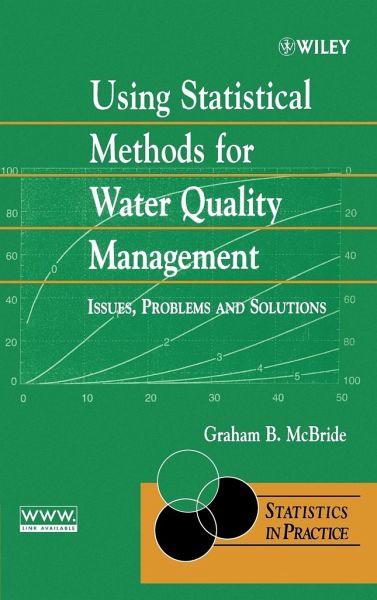
Using Statistical Methods for Water Quality Management
Issues, Problems and Solutions

PAYBACK Punkte
86 °P sammeln!
Using Statistical Methods for Water Quality Management: Issues, Problems, and Solutions covers practical and fundamental aspects of environmental statistics that are not covered in existing books on the topic. It also brings together topics that are treated individually in more general books that do not address environmental concerns.
STATISTICS IN PRACTICE
A practical exploration of alternative approaches to analyzing water-related environmental issues
Written by an experienced environmentalist and recognized expert in the field, this text is designed to help water resource managers and scientists to formulate, implement, and interpret more effective methods of water quality management.
After presenting the basic foundation for using statistical methods in water resource management, including the use of appropriate hypothesis test procedures and some rapid calculation procedures, the author offers a range of practical problems and solutions on environmental topics that often arise, but are not generally covered.
These include:
_ Formulating water quality standards
_ Determining compliance with standards
_ MPNs and microbiology
_ Water-related, human health risk modeling
_ Trends, impacts, concordance, and detection limits
In order to promote awareness of alternative approaches toanalyzing data, both frequentist and Bayesian, statistical methods are contrasted in terms of their applicability to various environmental issues. Each chapter ends with a number of set problems for which full answers are provided. The book also encourages discussion between technical staff and management before embarking on statistical studies.
A practical exploration of alternative approaches to analyzing water-related environmental issues
Written by an experienced environmentalist and recognized expert in the field, this text is designed to help water resource managers and scientists to formulate, implement, and interpret more effective methods of water quality management.
After presenting the basic foundation for using statistical methods in water resource management, including the use of appropriate hypothesis test procedures and some rapid calculation procedures, the author offers a range of practical problems and solutions on environmental topics that often arise, but are not generally covered.
These include:
_ Formulating water quality standards
_ Determining compliance with standards
_ MPNs and microbiology
_ Water-related, human health risk modeling
_ Trends, impacts, concordance, and detection limits
In order to promote awareness of alternative approaches toanalyzing data, both frequentist and Bayesian, statistical methods are contrasted in terms of their applicability to various environmental issues. Each chapter ends with a number of set problems for which full answers are provided. The book also encourages discussion between technical staff and management before embarking on statistical studies.




